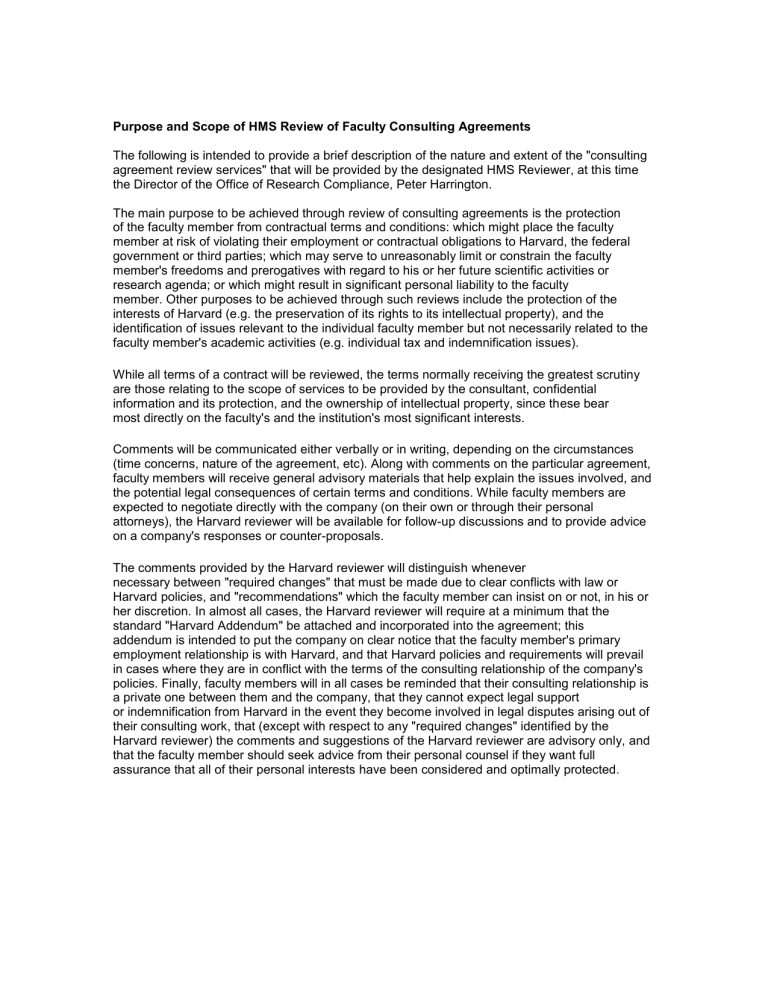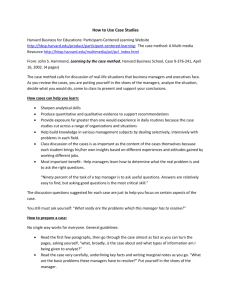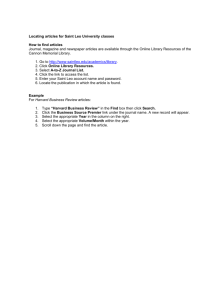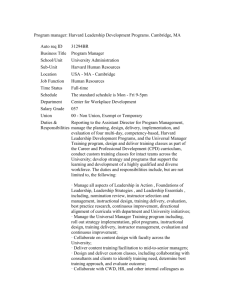Purpose and Scope of HMS Review of Faculty Consulting Agreements

Purpose and Scope of HMS Review of Faculty Consulting Agreements
The following is intended to provide a brief description of the nature and extent of the "consulting agreement review services" that will be provided by the designated HMS Reviewer, at this time the Director of the Office of Research Compliance, Peter Harrington.
The main purpose to be achieved through review of consulting agreements is the protection of the faculty member from contractual terms and conditions: which might place the faculty member at risk of violating their employment or contractual obligations to Harvard, the federal government or third parties; which may serve to unreasonably limit or constrain the faculty member's freedoms and prerogatives with regard to his or her future scientific activities or research agenda; or which might result in significant personal liability to the faculty member. Other purposes to be achieved through such reviews include the protection of the interests of Harvard (e.g. the preservation of its rights to its intellectual property), and the identification of issues relevant to the individual faculty member but not necessarily related to the faculty member's academic activities (e.g. individual tax and indemnification issues).
While all terms of a contract will be reviewed, the terms normally receiving the greatest scrutiny are those relating to the scope of services to be provided by the consultant, confidential information and its protection, and the ownership of intellectual property, since these bear most directly on the faculty's and the institution's most significant interests.
Comments will be communicated either verbally or in writing, depending on the circumstances
(time concerns, nature of the agreement, etc). Along with comments on the particular agreement, faculty members will receive general advisory materials that help explain the issues involved, and the potential legal consequences of certain terms and conditions. While faculty members are expected to negotiate directly with the company (on their own or through their personal attorneys), the Harvard reviewer will be available for follow-up discussions and to provide advice on a company's responses or counter-proposals.
The comments provided by the Harvard reviewer will distinguish whenever necessary between "required changes" that must be made due to clear conflicts with law or
Harvard policies, and "recommendations" which the faculty member can insist on or not, in his or her discretion. In almost all cases, the Harvard reviewer will require at a minimum that the standard "Harvard Addendum" be attached and incorporated into the agreement; this addendum is intended to put the company on clear notice that the faculty member's primary employment relationship is with Harvard, and that Harvard policies and requirements will prevail in cases where they are in conflict with the terms of the consulting relationship of the company's policies. Finally, faculty members will in all cases be reminded that their consulting relationship is a private one between them and the company, that they cannot expect legal support or indemnification from Harvard in the event they become involved in legal disputes arising out of their consulting work, that (except with respect to any "required changes" identified by the
Harvard reviewer) the comments and suggestions of the Harvard reviewer are advisory only, and that the faculty member should seek advice from their personal counsel if they want full assurance that all of their personal interests have been considered and optimally protected.





